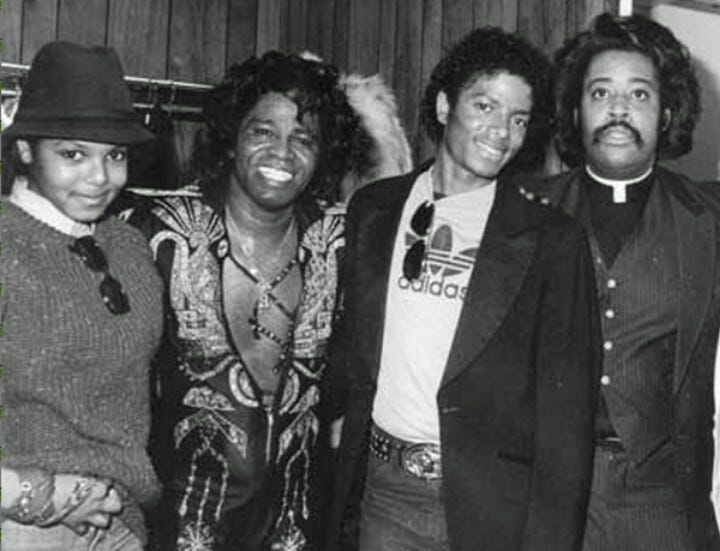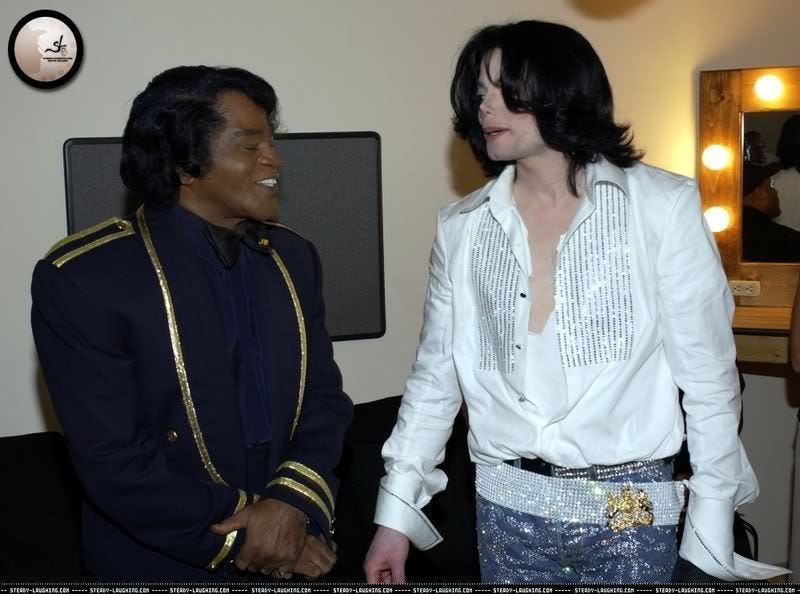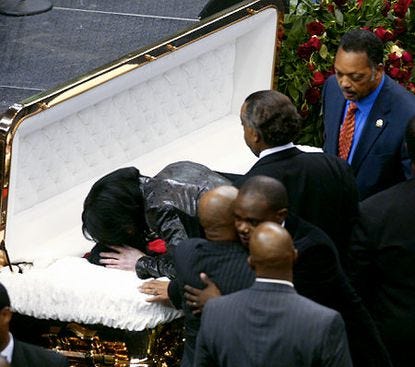Snatched, Part One.
On James Brown, Michael Jackson, D'angelo, and when the music demands that the body follow its laws.
The dead one is yours, the living one is mine. — Kings 3:22
I.
James Brown is said to have died of cardiac arrest on Christmas day, 2006. That’s the public account of his passing. There are persistent rumors and accusations that he was murdered, maybe poisoned, while in the hospital, that his autopsy was embellished, and that the public account of his cause of death is fraudulent. The whole event feels haunted, as if James Brown was casually hunted and silenced and anyone who notices should be quiet and let the myth speak. If you’re going to attempt a homicide of the Godfather of Soul, it makes sense to use the sacred and gaudy alibi of Christmas for synchronicity and anonymity. Right as Christ is being reborn, the Godfather is taken out in the middle of the night. Just as children all across the world are dreaming of gifts and sweet things, an anti-miracle is spinning into the collective record— and how do you mourn that kind of destiny with any accuracy, how do you override the festival for the funeral or forensics?
II.
We use the word snatched these days to suggest fitness and immaculate attentiveness to upswept beauty with all the lines and angles in the right place as if some kind of idyllic clone of the self—a Kardashian effect achieved by any means necessary. Snatched is the obsession with contouring the face with makeup and the body with shapewear until any disproportion is hemmed into alignment— skin hugging the bone and highlighting its slant with a shimmer in order to make it appear feline and divine. We say damn she looks snatched, or my ponytail is snatched, or her waist is snatched to indicate the effect or affect—an organically unattainable ratio of waist to ass mastered with the help of a triple-belted velcro trainer. To be snatched implies that at one point you were loose and desperate to get snatched and focused all of your efforts in that direction. The only reason the state of being snatched cannot be mocked endlessly is because it oozes with the brutal fruits of that desperation and pretends to be ordained by anything other than relentless devotion to a look and way of seeing and being seen. The snatched transcend the desperation that got them there, that is part of the snatched aesthetic. Those who achieve it both wink at you in a waist trainer, gasping with their eyes, and deny that any effort was made in an aloof almost coy looking away. There’s nothing wrong with being snatched, or taken by yourself, but other aspects of the identity do have to be displaced to make it possible, whether those aspects be the vital organs shifted by spandex or the gregarious circularity of the eyes tugged to a severe villain tilt by threads or pigments or elastic bands. And there seem to be slightly diminishing returns to getting snatched because any allure that is all costume goes out of style. The body itself was never meant to be discarded and reshaped like a garment. Classic beauty is one of a kind and enigmatic and the snatched are clones of an overhyped concept of beauty that will ultimately recede and become obscene or at best obsolete. But we cannot resist the temptation. Everyone is trying to get snatched.
III.
Beyond the body, this concept affects our music and all aesthetics because it affects our way of hearing and regarding the world. The counterpart of a snatched face and body in sound and music is tautness, a tight and supple rhythmic structure that breaks and snares militantly and then celebrates its contours by easing out of its own grip coolly. D’Angelo’s Voodoo (2000) is a snatched, album, taut, gathered through and through. Every crevice of that music is in its right place, every ad lip contributes to a statuesque beauty of form. D’Angelo himself during that era was also snatched. He’s pictured on the cover shirtless, and he solos half naked in the famously lusted after video for the track “Untitled” proving his skin is the canvass on which the music for Voodoo is inscribed. No muscle of his was out of place at the time. His body became how the music sounded and the music felt like watching the camera scan his perfect form as he screamed how does it feel into gospel. Lust into worship, yearning into faith in the unseen. Voodoo is the music of a secret world where we can admit that we want to look and feel like our favorite music. D’Angelo managed to accomplish that, it was part of his prowess as an artist at the time. Perfection might have been an obsession. As his body changed after Voodoo, his imagination had to change, there were lows followed by a triumphant return. When he could not clone his snatched self in later years the music would have to unravel a little too, become freer and less about perfect form, going from snatched to thick.
The world he created with Voodoo was predated by worlds invented by James Brown— a man’s world, that wouldn’t be nothing, nothing, without a woman or a girl. Brown’s music was also snatched, held up by a strict and addictive metronome that seduces and crushes, gives you hope and at the same time lets you revel in the power of defeat and surrender. Brown’s music is taut even when he drifts into passages of total begging on stage: he’ll collapse into a half-split and scream please eleven times in a row and then stand up and swivel his hips like no torment had ever crossed his tone, ruthlessly upbeat about payback, revenge, got to get back, snatched by the holy ghost into a level of endurance that seems superhuman, abducted by his own stage presence. Snatched music takes the musicians with it—the moment they become idle, the missing beats tend to show up as trouble. It’s hard to know perfect form and not suffer when any flaw arrives. The snatched bodies transcend flaws, the snatched music makes it easier to hear love the mechanics of a beauty that intent on itself. The snatched musician arouses our collective tendency to demand evidence of, and then reject, god. Great artists and performers know how to manipulate this habit by making you want to sin and repent at the same time in their presence.
IV.
Many of the snatched performers tend to be doubly snatched into the afterlife or a new phase of being as if god wants their bodies back and misses their souls. When this happened to James Brown, Michael Jackson showed up to the church the night before his funeral and spent 5 hours with the body. This was his long patient goodbye to his hero, the man who had inspired him to become Michael Jackson. As he imitated him in life, maybe a part of him wanted a similar departure. Or maybe he wanted to gather anything emanating from Brown to share with the world for his remaining three and half years. Or maybe it’s true that Michael is still alive somewhere and faked his death and this encounter with James Brown’s corpse was the start of that premeditation. Either way what their bodies endured in performance meant their souls could speak the same language across dimensions. Accounts of Jackson’s time with James Brown’s corpse call it strange and macabre, but I see it as displaced tenderness having to sneak into the crypt to express itself because neither man had much privacy in life or beyond. The audience snatches and holds onto the body of the performer for eternity. Neither Michael Jackson nor James Brown possessed themselves completely. Every song becomes a prayer for return to the source of the self, man in the mirror. Let the man whisper-sing to his friend’s inanimate body in peace. There’s another rumor that Brown’s family dismembered him in the casket following the funeral service, due to turmoil over the estate. Snatched, taken apart, remarkably consumed and discarded.
V.
How do we stop getting snatched? Why would we want to? You get to go from perfection to oblivion and back again and again until it’s an addiction and only those who share it truly understand you. And just when you think it’s over, or overcome, the industry trademarks your clone and sends you back on tour. What if many of your favorite artists are snatched duplicates of themselves, either literally, or because ideas other than their own have been implanted in their bodies and play them like polyrhythms, switching them on and off as we do our glowing machines. Would you know which ones and how to free them? Would you choose the dead version that substantiates your myths or the living one, resurrected and looking for his killer by sneaking up on culprits in samples and songs, haunting the earth until we restore his honor, being the reason the next singer gets snatched and interrogated. These men and women condemned to make perfect music and live imperfect lives simply because it’s in the blood to be uprooted, transported, and restored to music in new forms, part of the legacy of the middle passage.
When Kendrick Lamar resurrects and interrogates Tupac on “Mortal Man” (2015), ‘Pac says he thinks the ground is gonna open up and swallow the evil. He goes on to say, we ain’t even really rapping, we’re just letting our dead homies tell stories. Are the dead homies doing the snatching cloning and mimicking all the time, shedding information on the etheric plane that some of us pick up on as ideas, motivation, reasons to get snatched? And is that constant rapture, that subtle difference between being a radio and a zombie, a source of pleasure or horror, beauty or distortion?




![D'Angelo To Pay Tribute To James Brown — Tha Wire [VIDEO] D'Angelo To Pay Tribute To James Brown — Tha Wire [VIDEO]](https://substackcdn.com/image/fetch/$s_!2zWE!,w_1456,c_limit,f_auto,q_auto:good,fl_progressive:steep/https%3A%2F%2Fbucketeer-e05bbc84-baa3-437e-9518-adb32be77984.s3.amazonaws.com%2Fpublic%2Fimages%2F81ea4381-1687-4f8f-ba55-187edde3bed0_1200x1800.jpeg)

This immediately made me think of Lisa Lopes and Amy Winehouse.